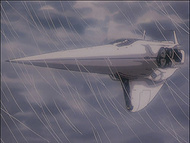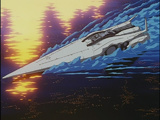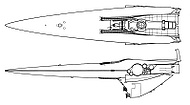Brünhild
From Gineipaedia, the Legend of Galactic Heroes wiki
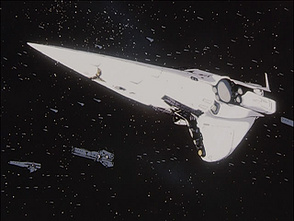 The supreme flagship Brünhild (800 UC (2 NIC / 491 IC / 3600 CE)) | |
| Affiliation: | Galactic Empire |
| Flag officer: | Fleet Admiral Lohengramm |
| Type: | Battleship |
| Purpose: | Supreme Flagship Flagship (Lohengramm Fleet) |
| Length: | 1007 metres(FFC1R) |
| Width: | 264 metres(FFC1R) |
| Height: | 273 metres(FFC1R) |
| Armament: | 16 25 cm neutron beam cannons 8 12 cm railguns 8 6 cm electron beam cannons missile launchers lasers |
| Crew: | 1171(FFC1R) |
| Status: | Decommissioned |
| Decommissioned: | 801 UC (3 NIC / 492 IC / 3601 CE) |
The Brünhild (Japanese: ブリュンヒルト) was the Imperial flagship of Reinhard von Lohengramm. The Brünhild served as a symbol of Reinhard and, later, the Goldenlöwe throne.
Contents |
Service history
Alliance–Imperial War
The Brünhild was the only ship of its kind, gifted to Reinhard von Lohengramm (known as von Müsel at the time) at the behest of Kaiser Friedrich IV, following his distinguished service at the Third Battle of Tiamat in 795 UC (486 IC / 3595 CE). (TBT: 'Part Two')
The Brünhild would serve as Reinhard's personal flagship throughout his life, playing a pivotal role in almost all of the greatest battles of the era. (My Conquest Is the Sea of Stars; LOGH: 'The Battle of Astarte', 'The Battle of Vermilion (Part One)', 'The Battle of Marr-Adetta Starzone (Part Two)', 'The Beautiful Maiden Wants Blood')
The Brünhild first fired its cannons in battle at the Battle of Legnica, where it fought against the Free Planets Alliance 2nd Fleet in 795 UC (486 IC / 3595 CE). The initial combat was indecisive, with the Brünhild coming within metres of the enemy flagship Patoroklos, but Reinhard was able to ignite the gas giant's hydrogen atmosphere with a nuclear fusion missile fired by the Brünhild, devastating the 2nd Fleet. (My Conquest Is the Sea of Stars)

The Brünhild was the flagship of the left wing of the Imperial fleet (under ultimate command of Fleet Admiral Gregor von Mückenberger) at the Fourth Battle of Tiamat, fought against several Alliance fleets shortly after the Battle of Legnica. Though the left wing, comprising the Lohengramm Fleet, was sent forward unsupported in an attempt by Mückenberger to rid himself of the troublesome young Admiral Müsel, Reinhard managed to save his fleet and come to the rescue of the hard-pressed Imperial fleet later in the battle.
With encirclement of the Alliance fleet complete and total victory at hand, the Brünhild was 'taken hostage' by the Alliance battleship Ulysses, under the command of Commodore Yang Wen-li — allowing the Alliance fleet to escape complete annihilation. (My Conquest Is the Sea of Stars)
At the Battle of Astarte in 796 UC (487 IC / 3596 CE), the Brünhild was at the head of the 20,000-strong fleet that defeated the Alliance 4th Fleet and 6th Fleet one after the other, and severely damaged the 2nd Fleet before Commodore Yang assumed command and managed to force a stalemate. (LOGH: 'In the Eternal Night', 'The Battle of Astarte'; Overture to a New War)
The Brünhild later served as the overall flagship of the combined Imperial fleets that launched the devastating counter-attack against the Alliance invasion force in October 796 UC (487 IC / 3596 CE). However, the Brünhild did not engage the enemy directly, with Fleet Admiral Lohengramm preferring to preside over the battle from afar so as not to usurp the glory of his subordinates. (LOGH: 'The Battle of Amritsar Starzone')
Imperial Civil War
The Brünhild was again in overall command of Imperial forces against the rebellious Lippstadt Alliance in 797 UC (488 IC / 3597 CE). For the majority of the campaign, it served as the overall command ship, but had the opportunity to fight on the front lines in the last battle of the war outside Geiersberg Fortress. (LOGH: 'The Fall of Goldenbaum')
Invasion of the Free Planets Alliance
The Brünhild served as the overall flagship for the main Imperial invasion force into Alliance territory in 799 UC (1 NIC / 490 IC / 3599 CE), and formed one of the 'heads' of Reinhard's 'two-headed snake' battle formation at the Battle of Rantemario against the Alliance fleet under Fleet Admiral Alexandre Bewcock. (LOGH: 'The Two-Headed Snake: The Battle of Rantemario')
At the Battle of Vermilion in 799 UC (1 NIC / 490 IC / 3599 CE), the destruction of the Brünhild (and the death of Duke Lohengramm) was the sole objective of the Alliance fleet under Fleet Admiral Yang Wen-li's command. Understanding this, Reinhard arrayed his fleet in a deeply layered defensive formation in front of the Brünhild, through which the Alliance could not penetrate, awaiting the planned arrival of his subordinates so that the Yang Fleet could be destroyed. (LOGH: 'Battle After Battle', 'The Battle of Vermilion (Part One)')
Eventually, a ruse by Fleet Admiral Yang caused Reinhard to combine his forces, which were then encircled and besieged. With the Brünhild left vulnerable, it came within seconds of being destroyed before the early arrival of the Müller Fleet saved the ship. Notwithstanding that, Yang was able to contain the Müller Fleet and bring the Brünhild directly in front of the cannons of his flagship, the Hyperion. However, the Alliance fleet was ordered to surrender by the Alliance High Council, and the Brünhild was once again saved. (LOGH: 'The Battle of Vermilion (Part One)', 'The Battle of Vermilion (Part Two)', 'Sudden Change')
In 800 UC (2 NIC / 491 IC / 3600 CE), the Brünhild led the New Imperial fleets against the Alliance fleet under Fleet Admiral Bewcock. Once more, the Alliance objective was solely to destroy the Brünhild and kill Kaiser Reinhard. Bewcock did not succeed, and the Alliance fleet was largely destroyed. (LOGH: 'The Battle of Marr-Adetta Starzone (Part One)', 'The Battle of Marr-Adetta Starzone (Part Two)')
Following the recapture of Iserlohn Fortress by the forces of Yang Wen-li (as leader of the El Facil Revolutionary Reserve Force), the Brünhild led the Imperial fleets into the Iserlohn Corridor to defeat Yang once and for all. As before, the Brünhild was Yang's target, but Yang's forces were repulsed by timely commands from Kaiser Reinhard. (LOGH: 'The Battle of the Corridor: Kaleidoscope', 'The Battle of the Corridor: End of the Campaign')
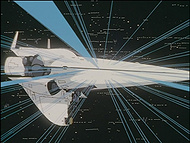
Final battles
Later in 800 UC (2 NIC / 491 IC / 3600 CE), an assassination attempt was carried out against Kaiser Reinhard while he was visiting the planet Uruvasi. The Brünhild itself came under fire from rogue Imperial troops, but was undamaged. Landing in a nearby lake, the Brünhild rescued the Kaiser and returned to Fezzan. (LOGH: 'The Urvashi Incident', 'In the Name of Pride')
In 801 UC (3 NIC / 492 IC / 3601 CE), at the Brünhild's final battle, the Imperial fleet under Reinhard fought against the forces of the Iserlohn Republic under Julian Mintz. With the Kaiser collapsing from a fever, Julian managed to fool the Imperial fleet with a feint and rush the Brünhild directly. Though it managed to destroy most of the on-rushing ships with cannon fire, Julian and the Rosen Ritter succeeded in forcibly boarding the supreme flagship via the Alliance strike ship Istoria. The Brünhild's crew killed most of the attackers — but not before Julian came before a temporarily recovered Reinhard, and negotiated for peace. Known as 'the ship that will never sink', this was the only time the Brünhild was ever damaged in battle. (LOGH: 'The Crimson Star Road', 'The Beautiful Maiden Wants Blood')
Decommissioning
The Brünhild was presumably decommissioned following the death of Kaiser Reinhard, just as the Barbarossa was after Siegfried Kircheis's death. There is a possibility that the Brünhild and Barbarossa were forever moored side by side back on Odin. (LOGH: 'Dream: To See It to the End')
Design
The Brünhild was an experimental prototype for a next-generation warship, laden with equipment that ignored mass production costs. It featured an armour system based on new theories, which could deflect cannon fire. (TBT: 'Part Two'; LOGH: 'The Beautiful Maiden Wants Blood')
It was slightly smaller than conventional flagships (such as the Wilhelmina, Ostmark, and Berlin), but its fire-power was superior. Unlike most other warships, the Brünhild's numerous cannons were not centralised in readily discernible locations. In addition to its powerful cannon armament, it mounted at least four missile launchers, each containing six launch tubes. (TBT: 'Part Two'; My Conquest Is the Sea of Stars)
Some of the Brünhild's experimental improvements, such as its beam-deflecting hull design, would later be implemented on the Perceval, the flagship of High Admiral Neidhart Müller and the first battleship commissioned following the establishment of the Neue Reich. (LOGH: 'Visitors')
Gallery
Stern (796 UC (487 IC / 3596 CE)) |
Dorsal (800 UC (2 NIC / 491 IC / 3600 CE)) |
Goldenbaum crest (795 UC (486 IC / 3595 CE)) |
Starboard (795 UC (486 IC / 3595 CE)) |
Missile launcher (795 UC (486 IC / 3595 CE)) |
Bridge (795 UC (486 IC / 3595 CE)) |
Bridge (801 UC (3 NIC / 492 IC / 3601 CE)) |
Appendices
Appearances
- My Conquest Is the Sea of Stars (first appearance)
- LOGH:
- 'In the Eternal Night'
- 'The Battle of Astarte'
- 'Liberation of the Frontier Zone'
- 'The Battle of Amritsar Starzone'
- 'New Trends'
- 'The Lippstadt Conspiracy'
- 'Bloodshed in Space'
- 'Courage and Loyalty'
- 'The Fall of Goldenbaum'
- 'The Day Before Destiny'
- 'Farewell, Distant Memories'
- 'Fezzan Occupied'
- 'The Two-Headed Snake: The Battle of Rantemario'
- 'Battle After Battle'
- 'The Battle of Vermilion (Part One)'
- 'The Battle of Vermilion (Part Two)'
- 'Sudden Change'
- 'Against All Flags'
- 'The Plan to Retake Iserlohn'
- 'The Prodigal Sons Come Home'
- 'The Battle of Marr-Adetta Starzone (Part One)'
- 'The Battle of Marr-Adetta Starzone (Part Two)'
- 'The Edict of the Winter Rose Garden'
- 'To the Windy Corridor'
- 'The Battle of the Corridor: The Invincible and the Undefeated'
- 'The Battle of the Corridor: Kaleidoscope'
- 'The Battle of the Corridor: End of the Campaign'
- 'Disappointing Victory'
- 'Premonition of a Storm'
- 'Rebellion Is a Hero's Privilege'
- 'The Two Great Ones Strike at Each Other!'
- 'Endless Requiem'
- 'Planet of Confusion'
- 'The Crimson Star Road'
- 'The Beautiful Maiden Wants Blood'
- 'The Golden Lion Flag Loses Its Lustre'
- 'Dream: To See It to the End'
- Overture to a New War
- TBT:
- 'Part Two'
Name variations
- Brünhild (LD/DVD subtitles)
- ブリュンヒルト (LD/DVD subtitles — Japanese)
Licensed sources
The Brünhild was a unique experimental flagship built as a testbed for the integration of multiple new technologies. Basic design work took a year alone and was undertaken by more progressive engineers long stifled by the conservative establishment. Like the Alliance, the Empire had dedicated flagship classes as fleets continued ballooning in size. The Brünhild was fitted with extensive command and control facilities capable of handling and coordinating a fleet as large as 100,000 ships or more. The costs to maintain and operate these ships was considerable and some of these costs would be passed on to the fleet commander, a rank which almost completely restricted to high nobles. They in turn would pass on the costs in the form of taxation of their personal fiefs.
The Brünhild had a new special armour coating which gave the ship its characteristic white gleaming colour. The coating was meant to deflect or dissipate beam weapons that struck it, and the Brünhild was the first field test of the technology. It was tested against the frontal cannons of the old Wilhelmina class flagships at a range of 5 light seconds with good results, however cost analysis showed the coating was too expensive for mass production. This final live fire testing was the culmination of nearly half a year of testing the ship's numerous new systems. (Fleet File Collection Vol.1R)
The coating proved effective in actual combat. During the Battle of Legnica, the Brünhild was observed to sustain no damage after being hit at close range by the 20cm neutron beam cannon main armament of the Alliance battleship Radl. (Data Book: Mechanic & Seiyū Encyclopaedia, p. 151)
Older Imperial battleship designs had mounted their main beam cannons in rows and columns at the prow of the ship. The Brünhild implemented a new philosophy of mounting new beam cannons capable of greater traverse and elevation along the upper hull of the ship in less easily visible mountings. Combined with the wedge shaped hull, the Brünhild could concentrate its firepower, giving it effective firepower that was superior to that of the old Wilhelmina class flagships.
At the rear of the ship were 4 extremely high thrust engines. They were capable of as much thrust as 3 large battleships giving the Brünhild combat mobility comparable to a cruiser despite having a mass comparable to other large battleships. For movement in atmosphere, the design relied on taking in outside atmospheric air, heating it via heat exchangers, and then expelling it from the rear for forward propulsion. The two bulges on either side of the rear hull were the air intakes. (Fleet File Collection Vol.1R)
The ship's sensors were situated in the lower hull and featured a full suite of lidar, visible light, infrared, and gravimetric sensors. In addition, the ship was the field test of new advanced FTL communications equipment and FTL sensors (both essential for a fleet's mobility in the warp). These versions were based on new theories and had nearly 2 times the range of the standard models, with possible room for more improvement.
A total of 36 Walküre fighters were mounted in the main hangars situated in the lower hull. For tactical reconnaissance, a high speed variant of the Walküre could be carried. In addition, there were 4 communication shuttles and 2 shuttles capable of entering and leaving atmosphere.
In the event of abandoning ship, emergency shuttles were available in various locations around the ship. In the lowest part of the lower hull was a hangar containing a large shuttle capable of carrying 250 people. There were a total of 4 such shuttles aboard the ship and 8 smaller ones. (Fleet File Collection Vol.1R)
The development of the Brünhild came as a considerable shock to the Free Planets Alliance. Initial intelligence reports had reported construction of a new Imperial flagship using new curved armour plating technology, but Alliance projections had anticipated a ship similar to the Forseti. The final appearance therefore of the Brünhild with its gleaming white coating came as a major shock.(Fleet File Collection Vol.9)
Background information
The name Brünhild is a reference to Brynhildr, a valkyrie (a female figure who carried the chosen slain to Valhalla, the hall of Odin) from Norse mythology.
Apocrypha
Appearance differences
The Brünhild's Goldenbaum crest does not have its unique inset lion image in My Conquest is the Sea of Stars. Whilst originally this was possibly intended to signify that at the time of being granted the Brünhild, Reinhard had not been granted the Lohengramm name, in Overture to A New War the Brünhild is seen with its unique crest on its return to Odin following the Fourth Battle of Tiamat - also before Reinhard's acquisition of the Lohengramm name. This inconsistency is further reinforced by the vessel's first appearance (chronologically) in The Third Battle of Tiamat, where it is also seen with its unique crest.
Fleet File Collection
The Brünhild is included as a model (with both Goldenbaum and Goldenlöwe markings) in Fleet File Collection Vol.1 and Fleet File Collection Vol.1R. In a 'Reader Memo' in Fleet File Collection Vol.9, it is mentioned that the 'Brünhild shock' (mentioned above) was analogous to the 'Dreadnought shock' on warship builders of the early 20th Century caused by the revolutionary design of the Dreadnought.
| v•d•e | |
|---|---|
| Asgrimm • Audhumla • Augsburg • Barbarossa • Beowulf • Bergelmir • Berlin • Brünhild • Dagda • Diarium • Eistla • Embla • Forseti • Garga Falmul • Göttingen • Grendel • Heidenheim • Helten • Heorot • Heremoss • Jotunheim • Königs Tiger • Kvasir • Kücrain • Langenberg • Lübeck • Morholt • Neustadt • Nördlingen • Nürnberg • Offenburg • Ostfalen • Ostmark • Perceval • Quermark • Salamander • Sindur • Skirnir • Tannhäuser • Theodoricus • Tristan • Ulfrun • Vanadis • Valendown • Vigrissr • Vissarr • Vonkel • Watzmann • Wilhelmina | |
